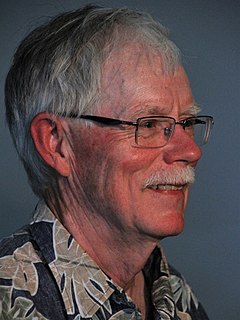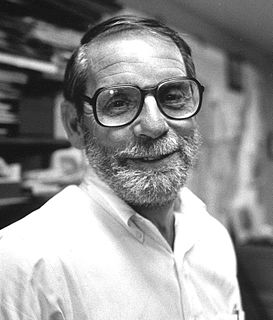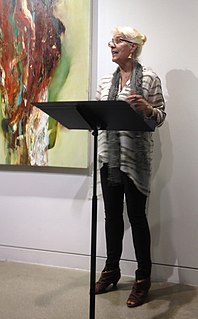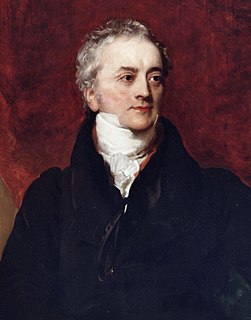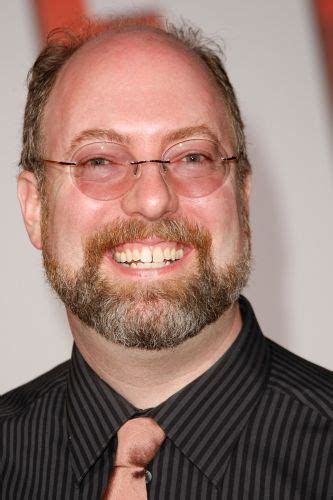Top 891 Distinct Quotes & Sayings - Page 15
Explore popular Distinct quotes.
Last updated on April 21, 2025.
Even in relativity theory even though you can analyze space - time in terms of this four-dimensional geometrical structure one of the dimensions is different. And this shows up in the equations. It has a different sign - rather than plus it shows up as a negative minus. So even in relativity theory time is distinct from space in terms of the way in which these dimensions manifest themselves in the equations.
Keep always in mind the rule of faith which I profess and by which I bear witness that the Father and the Son and the Spirit are inseparable from each other, and then you will understand what is meant by it. Observe now that I say the Father is other [distinct], the Son is other, and the Spirit is other. This statement is wrongly understood by every uneducated or perversely disposed individual, as if it meant diversity and implied by that diversity a separation of Father, Son, and Holy Spirit
The cast, staff, and crew of a live theater work together toward a common goal: a good performance. Thus, theater is necessarily a group effort. However, it is never a group effort of vague fellow committee members, but of associated autocrats-a playwright, a producer, a director, a stage manager, designers, and, above all, actors. Each accommodates the others, and may overlap others in function when necessary. But each autocrat assumes distinct responsibilities and accepts them completely.
Sun is very distinct through the eclipse. You go from bright sunlight to twilight in a matter of 10 seconds. And everybody around you will start screaming like the home team just made a touchdown at the Super Bowl. It will be unmistakable when it's safe. Plus, if you're looking through the eclipse glasses, the crescent sun will get thinner and thinner and thinner, and then it will vanish. Then it's totality, and it's safe to look.
I... [proposed] three distinct grades of education, reaching all classes. 1. Elementary schools for all children generally, rich and poor. 2. Colleges for a middle degree of instruction, calculated for the common purposes of life and such as should be desirable for all who were in easy circumstances. And 3d. an ultimate grade for teaching the sciences generally and in their highest degree... The expenses of [the elementary] schools should be borne by the inhabitants of the county, every one in proportion to his general tax-rate. This would throw on wealth the education of the poor.
We profess to teach the principles and practice of medicine, or, in other words, the science and art of medicine. Science is knowledge reduced to principles; art is knowledge reduced to practice. The knowing and doing, however, are distinct. ... Your knowledge, therefore, is useless unless you cultivate the art of healing. Unfortunately, the scientific man very often has the least amount of art, and he is totally unsuccessful in practice; and, on the other hand, there may be much art based on an infinitesimal amount of knowledge, and yet it is sufficient to make its cultivator eminent.
One of the great weaknesses of the progressive, as distinct from the religious, mind, is that it has no awareness of truth as such; only of truth in terms of enlightened expediency. The contrast is well exemplified in two exact contemporaries - Simone Weil and Simone de Beauvoir; both highly intelligent and earnestly disposed. In all the fearful moral dilemmas of our time, Simone Weil never once went astray, whereas Simone de Beauvoir, with I am sure the best of intentions, has found herself aligned with apologists for some of the most monstrous barbarities and falsehoods of history.
Get up now and go and find Robert Kilroy-Silk. Smile in a warm, friendly sort of way, then punch him on the nose. Now go and find Robert on television, despite my best endeavours, this is still relatively easy to do. Wait for a close-up, same smile, and punch him on the nose. If you followed the instructions carefully, you will have noticed a distinct difference. On the one hand, you were suffused with a sense of public-spirited righteousness; on the other, you're probably dribbling blood. That's the difference between reality in life and reality on television.
If the estimated age of the cosmos were shortened to seventy-two years, a human life would take about ten seconds. But look at time the other way. Each day is a minor eternity of over 86,000 seconds. During each second, the number of distinct molecular functions going on within the human body is comparable to the number of seconds in the estimated age of the cosmos. A few seconds are long enough for a revolutionary idea, a startling communication, a baby's conception, a wounding insult, a sudden death. Depending on how we think of them, our lives can be infinitely long or infinitely short.
I am aware that the conclusions arrived at in this work will be denounced by some as highly irreligious; but he who denounces them is bound to show why it is more irreligious to explain the origin of man as a distinct species by descent from some lower from, through the laws of variation and natural selection, than to explain the birth of the individual through the laws of ordinary reproduction. The birth both of the species and of the individual are equally parts of that grand sequence of events, which our minds refuse to accept as the result of blind chance.
There are at least two distinct meanings of 'hot': there is the, like, normal human definition which is that 'this individual seems suitable for mating'. And then there's the weird, culturally constructed definition of 'hot' which means, 'that individual is malnourished and has probably had plastic bags inserted into her breasts'. Like, I think if you went back to the 18th century and asked a 15-year-old boy, 'Would you like to marry a woman who has had plastic bags needlessly inserted into her breasts?' that 15-year-old boy would probably be like ... 'What's plastic?'
There are certain writers I can't read when I'm trying to write because their voices are so distinct. Cormac McCarthy, he's the most different writer from anything I've ever written, but there's something about those really spare sentences that is just tough - it would be too much of an influence. Grace Paley is my favorite writer. Her stuff is so voice-driven, when I read her a lot I want to make my writing more voice-y and dialogue-heavy. I love a lot of stuff in translation.
A quarter-horse jockey learns to think of a twenty-second race as if it were occurring across twenty minutes--in distinct parts, spaced in his consciousness. Each nuance of the ride comes to him as he builds his race. If you can do the opposite with deep time, living in it and thinking in it until the large numbers settle into place, you can sense how swiftly the initial earth packed itself together, how swiftly continents have assembled and come apart, how far and rapidly continents travel, how quickly mountains rise and how quickly they disintegrate and disappear.
The Iranian issue I don't think has much to do with nuclear weapons frankly. Nobody is saying Iran should have nuclear weapons nor should anybody else. But the point in the Middle East, as distinct from North Korea, is that this is center of the world's energy resources. Originally the British and secondarily the French had dominated it, but after the Second World War, it's been a U.S. preserve. That's been an axiom of U.S. foreign policy, that it must control Middle East energy resources.
What differentiates time from space is that time does have a direction. In that sense it is different from space. I think that's certainly true that whereas spatial dimensions don't have direction or an arrow, time does. It runs from past to future. But I see that arrow of time as rooted in a deeper metaphysical reality, namely the reality of temporal becoming - of things coming to be and passing away. That is why time has this arrow. But it's not sufficient to simply say that time and space are distinct because time has a direction. The question will be: why does it have a direction?
Yet, after all, faith is not our righteousness. It is accounted to us in order to righteousness (Rom 4:5, GREEK), but not as righteousness; for in that case it would be a work like any other doing of man, and as such would be incompatible with the righteousness of the Son of God; the righteousness which is by faith. Faith connects us with the righteousness, and is therefore totally distinct from it. To confound the one with the other is to subvert the whole gospel of the grace of God. Our act of faith must ever be a separate thing from that which we believe.
An ethic of maternalism was central to the utopianism of 19th century feminists. I don't think that today's women see motherhood as a source of personal power, let alone political power. I don't think that women now have that same sense that their lives as mothers gives them any special power or virtue. I think women see their lives as mothers as an adjunct to their working lives - a fulfilling and important adjunct, to be sure - but something they do in addition to working in the public realm, not because being a wife and mother gives them a distinct edge in improving the world as we know it.
We do not ask what hope of gain makes a little bird warble, since we know that it takes delight in singing because it is for that very singing that the bird was made, so there is no need to ask why the human mind undertakes such toil in seeking out these secrets of the heavens. ... And just as other animals, and the human body, are sustained by food and drink, so the very spirit of Man, which is something distinct from Man, is nourished, is increased, and in a sense grows up on this diet of knowledge, and is more like the dead than the living if it is touched by no desire for these things.
As for the ethics, law, and politics relationship, there has always been a tension for me as I try to keep them distinct while recognizing their interactions. A valuable contribution to my thinking there and elsewhere was Ellen Meiksins Wood's Mind and Politics, which reinforced for me the ways in which seemingly disparate philosophical endeavors were/are interconnected, and although I have tended to give a certain priority to ethical considerations as part of practical reasoning, I am reminded often enough that this position makes some contentious presumptions .
Markets are not, in my opinion, a full solution to any problem. The obvious problem they don't meet is the concerns of the welfare of individuals who may get lost in the operation of the system - the distributional question. We've seen this growing as we go further and further toward a market ideology in the United States and the United Kingdom. We've seen a decline in the welfare of the working poor, leaving aside any other pathologies, just the working poor, a very distinct increase at the very top levels.
I think Hip Hop and Gospel are such strong distinct cultures that have problems, unspoken problems obviously, but problems with one another. On the hip hop side, it's the problems of "awe man I don't like the suits and ties," and on the Gospel side it's " awe man they need to pull their pants up." I just think those are minor, really small issues that we just need to get over and learn to help each other. We're all on the same , and in the same boat.
Principles are concepts that can be applied over and over again in similar circumstances as distinct from narrow answers to specific questions. Every game has principles that successful players master to achieve winning results. So does life. Principles are ways of successfully dealing with the laws of nature or the laws of life. Those who understand more of them and understand them well know how to interact with the world more effectively than those who know fewer of them or know them less well.
"It is essential to understand this point thoroughly: that the thing-in-itself, whether animal, vegetable, or mineral, is not only unknowable-it does not exist. This is important not only for sanity and peace of mind, but also for the most "practical" reasons of economics, politics, and technology.. This is not to say only that things exist in relation to one another, but that what we call "things" are no more than glimpses of a unified process. Certainly, this process has distinct features which catch our attention, but we must remember that distinction is not separation."
Mayfield said, "You asked what I was thinking. Well, I will tell you. I was thinking that a man like myself, after suffering such a blow as you men have struck on this day, has two distinct paths he might travel in his life. He might walk out into the world with a wounded heart, intent on sharing his mad hatred with every person he passes; or, he might start out anew with an empty heart, and he should take care to fill it up with only proud things from then on, so as to nourish his desolate mind-set and cultivate something positive or new.
It's hard to try to be a canary in the coal mine in Internet because right now we're enjoying such innovation. But at the same time, we are truly in the midst of a sea change in how controllable the technology we use day by day is, and it is getting more and more controllable by a distinct group of entities, who may have our best interests in mind, at least at consumers right now, but they can change their minds or be regulated, forced to change their minds later.
Our youth can not understand why society chooses to criminalize a behavior with so little visible ill effect or adverse social impact... These young people have jumped the fence and found no cliff. And the disrespect for the possession laws fosters a disrespect for laws and the system in general... On top of this is the distinct impression among the youth that some police may use the marihuana laws to arrest people they don't like for other reasons, whether it be their politics, their hair style or their ethnic background.
When Dawn looked at Vic, she saw Vic exactly as he wanted to be seen. Whereas Vic's parents couldn't help seeing who he used to be, and so many friends and strangers couldn't help seeing who he didn't want to be anymore, Dawn only saw him. Call it a blur if you want, but Dawn didn't see a blur. She saw a very distinct, very clear person.
Poetic experience is distinct in nature from mystical experience. Because poetry emanates from the free creativity of the spirit,it is from the very start oriented toward expression, and terminates in a word proffered, it wants to speak; whereas mystical because it emanates from the deepest longing of the spirit bent on knowing, tends of itself toward silence and internal fruition. Poetic experience is busy with the created world and the enigmatic and innumerable relations of existents with one another, not with the Principle of Being.
I'm sort of old-fashioned in the sense that I like to write something that I feel I could just perform alone, obviously, because I do that a lot in concert. So I try to make a song where there is as much that is as distinct as I can get it, just if I'm playing it or if I'm singing it. That makes me really do a lot of stuff in the guitar work when I sit and try to figure out how to indicate what sort of dynamic I'm aiming for. Where, rhythmically, I want to go. That's sort of what ties a lot of different records together, is that it's usually always based around me singing and playing a guitar.
The word "spiritual" normally means something that's distinct from the fleshly or the material. It's not of the world. But that version of spirituality is bankrupt today. It had its use when the program of science divested matter from the spiritual qualities - - the qualities of a self, or of a being. When science divested the world of those qualities and made it into just a thing, rather than a self, it gave us license to treat it as just a thing, and not as something sacred, conscious, alive, intelligent. So this is tied into the whole trajectory of our civilization.
Machines have given us a new ability to count and make our understanding quantitative. The Web connects news gatherers with audiences in ways that were never possible before and can bring a breadth of intelligence, and experiences to understanding the news we never had. And professional reporters and editors still have a unique role to play in triangulating those inputs as well as bringing three other distinct skills - access to interrogate people in power, exceptional storytelling skills, and a discipline of open minded, skeptical inquiry - which are not as likely to be found elsewhere.
Perfectionism and optimalism are not distinct ways of being, an either-or choice, but rather they coexist in each person. And while we can move from perfectionism toward optimalism, we never fully leave perfectionism behind and never fully reach optimalism ahead. The optimalism ideal is not a distant shore to be reached but a distant star that guides us and can never be reached. As Carl Rogers pointed out, ‘The good life is a process, not a state of being. It is a direction, not a destination
Unless you see your nature, you shouldn't go around criticizing the goodness of others. There's no advantage in deceiving yourself. Good and bad are distinct. Cause and effect are clear. But fools don't believe and fall straight into a hell of endless darkness without even knowing it. What keeps them from believing is the heaviness of their karma. They're like blind people who don't believe there's such a thing as light. Even if you explain it to them, they still don't believe, because they're blind. How can they possibly distinguish light?
I can't give a formula for how to spread joy, but I know that the source of the joy is one's own joy, and that that is not distinct from pleasure and fulfillment of desires. So I ask: What makes me feel alive? What is the expression of my inner wild? What would really feel good? What if what makes me feel alive leads me toward the deeper joys, which are found in generosity and service, in creating things that are beautiful to me? Maybe the world needs more of that. How many petroleum company executives are doing their work because it's beautiful to them? Not very many, I bet.
The journey toward authenticity, toward becoming whole is made palpable in Maureen Seaton's Sex Talks to Girls: A Memoir. It shines its considerable light on the passage from religion toward faith, from self-medication to sobriety, from daughterhood to motherhood, from being the disembodied 'good girl' to embracing her own bad lesbian self. In crisp chapters, Seaton leads us, step-by-step, over this harrowing and blissful road, so distinct from yet so much like our own.
"It is light that reveals, light that obscures, light that communicates. It is light I "listen" to. The light late in the day has a distinct quality, as it fades toward the darkness of evening. After sunset there is a gentle leaving of the light, the air begins to still, and a quiet descends. I see magic in the quiet light of dusk. I feel quiet, yet intense energy in the natural elements of our habitat. A sense of magic prevails. A sense of mystery. It is a time for contemplation, for listening - a time for making photographs. "
The fulfilment that is being in love with God is not the product of our knowledge and choice. It is God's gift. Like all being in love, as distinct from particular acts of loving, it is a first principle. So far from resulting from our knowledge and choice, it dismantles and abolishes the horizon within which our knowing and choosing went on, and it sets up a new horizon within which the love of God transvalues our values and the eyes of that love transform our knowing.
Restrooms at gas stations were an unpleasant and shocking surprise; I had never considered the serious drawbacks of such lazily-cleaned rooms. I was completely unable to ignore the filth, and wasted a burst of power to turn the sink, floors and porcelain toilet into sparkling, clean examples of their kind before using the facility. I felt that was a much less judgmental response than simply blowing the place off the face of the Earth, which was also a distinct temptation, especially when the storekeeper overcharged me for a bottle of cold water.
[T]he most common and durable source of factions has been the various and unequal distribution of property. Those who hold and those who are without property have ever formed distinct interests in society. Those who are creditors, and those who are debtors, fall under a like discrimination. A landed interest, a manufacturing interest, a mercantile interest, a moneyed interest, with many lesser interests, grow up of necessity in civilized nations, and divide them into different classes, actuated by different sentiments and views.
The Palestinian people does not exist. The creation of a Palestinian state is only a means for continuing our struggle against the state of Israel for our Arab unity. In reality today there is no difference between Jordanians, Palestinians, Syrians and Lebanese. Only for political and tactical reasons do we speak today about the existence of a Palestinian people, since Arab national interests demand that we posit the existence of a distinct 'Palestinian people' to oppose Zionism.
Nothing in Chomsky's account acknowledges the difference between intending to kill a child, because of the effect you hope to produce on its parents (we call this “terrorism”), and inadvertently killing a child in an attempt to capture or kill an avowed child murderer (we call this “collateral damage”). In both cases a child has died, and in both cases it is a tragedy. But the ethical status of the perpetrators, be they individuals or states, could not be more distinct For Chomsky, intentions do not seem to matter. Body count is all.
Although you can find certain differences among the Buddhist philosophical schools about how the universe came into being, the basic common question addressed is how the two fundamental principles-external matter and internal mind or consciousness-although distinct, affect one another. External causes and conditions are responsible for certain of our experiences of happiness and suffering. Yet we find that it is principally our own feelings, our thoughts and our emotions, that really determine whether we are going to suffer or be happy.
Cartooning is completely different from other media: it is closely related to film and prose, other narrative forms, but the skills needed to realize a story are very different, and include not only drawing and writing dialogue and narration, but graphic design and the ability to depict time passing visually. It's a whole suite of skills that has to go into making a comics page, skills that are quite distinct from those that go into writing a page of prose, or making a film.
Pick a man, any man. Every guy I fall for becomes Jesus Christ within the first twenty-four hours of our relationship. I know that this happens, I see it happening, I even feel myself, sometimes, standing at some temporal crossroads, some distinct moment at which I can walk away and keep it from happening, but I never do. I grab at everything, I end up with nothing, and then I feel bereft. I mourn for the loss of something I never even had.
I woke up as the sun was reddening; and that was the one distinct time in my life, the strangest moment of all, when I didn't know who I was - I was far away from home, haunted and tired with travel, in a cheap hotel room I'd never seen, hearing the hiss of steam outside, and the creak of the old wood of the hotel, and footsteps upstairs, and all the sad sounds, and I looked at the cracked high ceiling and really didn't know who I was for about fifteen strange seconds. I wasn't scared; I was just somebody else, some stranger, and my whole life was a haunted life, the life of a ghost.
We need others for our physical, emotional, and spiritual well-being. Without others we are nothing. Our sense that we are an island, an independent, self-sufficient individual, bears no relation to reality. It is closer to the truth to picture ourself as a cell in the vast body of life, distinct yet intimately bound up with all living beings. We cannot exist without others, and they in turn are affected by everything we do. The idea that it is possible to secure our own welfare while neglecting the welfare of others, or even at the expense of others, is completely unrealistic.
It equally proves, that though individual oppression may now and then proceed from the courts of justice, the general liberty of the people can never be endangered from that quarter; I mean so long as the judiciary remains truly distinct from both the legislature and the Executive. For I agree, that "there is no liberty, if the power of judging be not separated from the legislative and executive powers." And it proves, in the last place, that as liberty can have nothing to fear from the judiciary alone, but would have every thing to fear from its union with either of the other departments.
If we seek for the simplest arrangement, which would enable it [the eye] to receive and discriminate the impressions of the different parts of the spectrum, we may suppose three distinct sensations only to be excited by the rays of the three principal pure colours, falling on any given point of the retina, the red, the green, and the violet; while the rays occupying the intermediate spaces are capable of producing mixed sensations, the yellow those which belong to the red and green, and the blue those which belong to the green and violet.
Often, we try to repair broken things in such a way as to conceal the repair and make it “good as new.” But the tea masters understood that by repairing the broken bowl with the distinct beauty of radiant gold, they could create an alternative to “good as new” and instead employ a “better than new” aesthetic. They understood that a conspicuous, artful repair actually adds value. Because after mending, the bowl's unique fault lines were transformed into little rivers of gold that post repair were even more special because the bowl could then resemble nothing but itself.
Of course, even if the directors like my ideas or the designs I do, they may end up changing the story so much, that those characters have to change, or get cut out altogether, and that's just the way it is. Sometimes the directors are designers themselves, or they want to work with a character designer who will do things in their own distinct way - sometimes the most important thing I do is figure out what they don't want to do, by experimenting. Either way, whether they use my ideas or not, I get paid, so it's all good.



